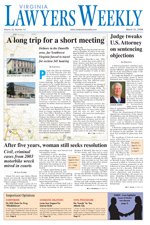In case you’ve been waiting for a Virginia court to weigh in on the theory of “deepening insolvency,” that time has come.
The theory is a way of holding corporate directors liable for operating a financially strapped company in a way that only digs a deeper hole – penalizing them for not knowing when to quit.
“Deepening insolvency” has drawn a fair amount of academic debate since it first cropped up in the early 1980s, but the theory has been on the wane since a Delaware court rejected it last year.
U.S. Bankruptcy Judge Kevin Huennekens threw out the claim in a new case, In re James River Coal Co. (VLW 007-4-003). In JRCC, a coal company and its 21 subsidiaries sought to reorganize under Chapter 11. The trustee of a liquidating trust sued First Reserve, an entity that included major shareholders of the coal company and the managing general partner of the shareholder funds.
The trustee claimed that First Reserve and its directors, “by virtue of their overreaching, domination and control” over the debtors’ businesses, fraudulently or negligently “prolonged the corporation’s existence for more than three years.”
Huennekens said that application of the theory “would fundamentally transform Virginia law,” which does not require a financially challenged company to abruptly wind up its business and liquidate its assets.
“Simply because a business may be failing does not make the directors personally responsible for insuring the success of the business strategies they decide to pursue,” the bankruptcy judge said.
Subscribe to:
Post Comments (Atom)

No comments:
Post a Comment